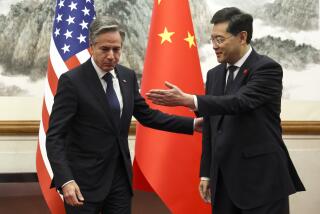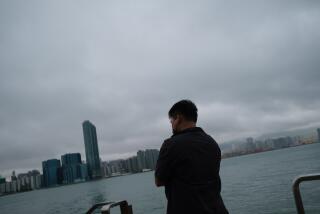Pressuring Hong Kong From Within
- Share via
HONG KONG — Two sons of China to be proud of: one an 18-year-old musical prodigy fresh from triumph in Europe, the other a respected writer and newly minted recipient of the Nobel Prize in literature.
Both passed through Hong Kong within days of each other recently, and the official reception they received constituted a jarring--and, for many, troubling--contrast. That contrast is merely one in a series of recent incidents that, collectively, have raised new questions about the extent of the territory’s autonomy from Beijing.
For pianist Li Yundi, officialdom radiated pride at his achievement in October of becoming the youngest pianist ever to win the prestigious Frederic Chopin international competition in Warsaw. The territory’s senior political figures, including Chief Executive Tung Chee-hwa, took prime seats for a Sunday evening recital at Hong Kong’s Cultural Center, and the regional government had insisted on so many seats for other officials that many of Li’s real fans felt shut out.
Literary followers of Gao Xingjian had no such problem.
To be sure, during a three-day visit that ended Thursday, China’s first Nobel laureate for literature drew large and enthusiastic crowds at a series of public appearances. Hong Kong’s political leadership, however, was conspicuously scarce.
Home Affairs Secretary W. K. Lam did manage to join an audience of about 1,000 to hear Gao lecture at a local university Tuesday, but his demeanor reflected more a sense of obligation than enjoyment.
Meanwhile, the rest of Hong Kong’s political elite kept its distance, pleading lack of time, scheduling conflicts or both.
For those who monitor the political pulse in the territory, the stark difference in treatment given the two cultural giants carried a simple explanation: the shadow of Beijing.
Li is celebrated on the Chinese mainland. The 61-year-old Gao is an outcast. His writings, many of which challenge the Communist system, are banned on the mainland. He has lived in exile in Paris for more than a decade, and his Nobel is viewed by leaders in Beijing mainly as a Western-motivated political insult.
While Hong Kong officials argued that Gao’s very presence in the territory underscored the vitality of the region’s unique status, others aren’t so sure.
Many fear that Hong Kong’s high level of autonomy from Beijing, together with its liberal personal and political freedoms, is under renewed threat.
Initially, analysts believed that the biggest danger to the unusual political experiment--commonly referred to as “one country, two systems”--would be overt meddling by the Communist leadership in Beijing. But recent events indicate that the real threat to Hong Kong’s autonomy may lie closer to home: in a regional government seemingly more intent on avoiding confrontation with Beijing than protecting the territory’s unique status.
Last month, for example, the government triggered consternation among pro-democracy activists by calling on Hong Kong’s highest court to seek Beijing’s guidance in a legal dispute involving the right of permanent residence in the territory. Its referral of an earlier court ruling on the same subject to Beijing was deemed especially damaging to the independence of Hong Kong’s judiciary.
The territory’s justice officials argue that the Basic Law--Hong Kong’s de facto constitution--requires such a step, but others see the move as a misguided, unnecessary and potentially dangerous invitation to the mainland to intervene.
“One of Hong Kong’s main strengths is its rule of law,” noted Christine Loh, a respected political voice and former member of the region’s Legislative Council. “The government touches it at its own peril.”
News of the appeal for Beijing’s legal guidance broke less than a week after one of the region’s most articulate defenders of democratic rights, Chief Secretary Anson Chan, announced that she would take premature retirement.
On Thursday, there were signs that Hong Kong’s leaders were also being influenced by Beijing’s renewed crackdown against members of the Falun Gong spiritual movement as the region’s secretary for security, Regina Ip, said, “We will be keeping a watch on their activities.”
“I’m worried,” summed up Law Yuk-kai, director of the independently funded Hong Kong Human Rights Monitor. “We have these freedoms that are supposedly entrenched in the Basic Law, but they are being taken too lightly.”
More to Read
Sign up for Essential California
The most important California stories and recommendations in your inbox every morning.
You may occasionally receive promotional content from the Los Angeles Times.













